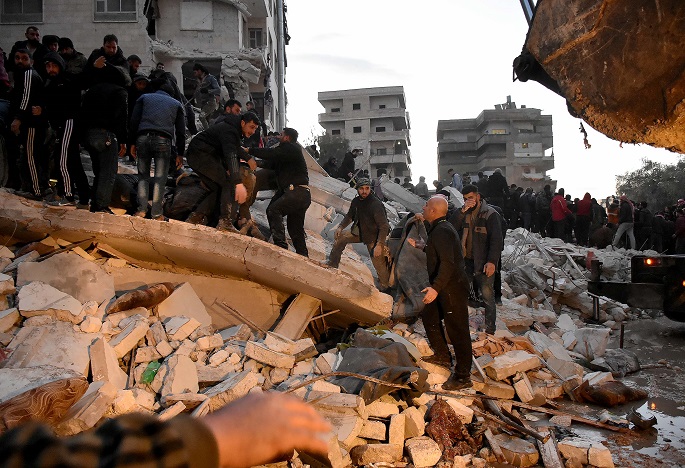More than 1,600 killed after earthquakes jolt Turkey, Syria
Published : 06 Feb 2023, 10:09
Updated : 06 Feb 2023, 20:03
More than 1,600 people were killed and thousands of others injured after strong earthquakes jolted parts of Turkey and northwest of Syria early Monday, as local rescuers are battling harsh winter conditions to search for survivors under rubble, reported Xinhua.
A magnitude-7.7 earthquake struck Türkiye's southern province of Kahramanmaras at 4:17 a.m. local time (0117 GMT). It was followed by a magnitude-6.4 quake a few minutes later in the country's southern province of Gaziantep and a magnitude-7.6 earthquake at 1:24 p.m. local time (1024 GMT) in the Kahramanmaras Province.
At least 78 aftershocks were recorded, Turkish Vice President Fuat Oktay has said. The quakes were also felt in Lebanon, Israel and Cyprus.
In Turkey, 1,121 people were killed, 7,634 injured and 2,824 buildings damaged, the country's Disaster and Emergency Management Authority (AFAD) said.
The most serious property damage and loss of lives occurred in the Pazarcik, Elbistan and Turkoglu districts of Kahramanmaras Province, Turkey 's NTV reported.
In war-torn Syria, the health ministry said at least 371 people were killed and 1,089 others injured in the country, excluding the casualties in the rebel-held areas in Idlib Province. The Syrian Observatory for Human Rights, a pro-rebel Britain-based watchdog, said 150 people were killed by the earthquake in the provinces of Idlib and Aleppo.
Soon after the tremors, Turkey 's state-owned energy company BOTAS suspended natural gas flow to the southern provinces of Gaziantep, Hatay and Kahramanmaras. The airport in Hatay was damaged and flights were halted.
Turkish Energy Minister Fatih Donmez said there were power outages in the provinces of Antep, Hatay and Kilis, according to Turkish media reports.
People trying to leave the quake-hit areas, causing traffic jams and hampering emergency efforts, the NTV reported.
The temperatures were recorded as minus 10 degrees Celsius in most of the 10 Turkish provinces that were affected by the quakes, which came with rains and snowfall, according to Turkey 's meteorology agency.
RELIEF OPERATIONS UNDERWAY
Turkey 's Defense Ministry has put the Turkish Armed Forces Humanitarian Aid Brigade and transport planes on standby. Defense Minister Hulusi Akar, the chief of general staff and the chief of land forces were all heading to the affected areas.
"We dispatched all our search and rescue teams to earthquake zones. We set the highest alert," Turkish Interior Minister Suleyman Soylu told reporters.
Ali Yerlikaya, the governor of Türkiye's largest city Istanbul, said on social media that over 1,000 people, including healthcare workers, four search and rescue dogs, and 30 tonnes of aid materials had been dispatched to the quake-hit region.
Tunc Soyer, mayor of the city of Izmir on Turkey 's western coast, announced that the municipality's search and rescue teams, comprised of seven vehicles and 41 people, had been sent to the southeastern province of Osmaniye.
Many Turkish provinces near the quake-hit areas have also sent medical teams and ambulances, according to local media reports.
In Syria, soon after the earthquake, the government set up a 24-hour central operation center led by Prime Minister Hussein Arnous to coordinate earthquake relief operations. All relevant ministries, institutions and authorities were on alert, state news agency SANA reported.
Relief operations were already underway in the central Syrian city of Hama, according to Syrian Interior Minister Muhammad Khaled Rahmoun.
"Rescuers have started to save people from under the rubble, hospitalize the wounded, provide medical help to the wounded, and secure shelters for people whose buildings were damaged," he said.
Historic sites in Syria were affected. Parts of the Ottoman mill in the Citadel of Aleppo fell and the defensive walls have cracks, said the antiquities and museums directorate.
OTHER COUNTRIES SEND CONDOLENCES, OFFER TO HELP
Soon after the earthquakes, Chinese President Xi Jinping sent messages of condolence to Turkish President Recep Tayyip Erdogan and Syrian President Bashar al-Assad respectively.
In two separate messages to his Turkish and Syrian counterparts, Iranian President Ebrahim Raisi on Monday expressed Iran's readiness to provide Turkey and Syria with immediate rescue and relief aid, according to the website of the Iranian president's office.
Lebanon's caretaker Prime Minister Najib Mikati on Monday ordered relevant Lebanese ministries to support Turkey and Syria after the powerful earthquakes hit the two countries.
While condoling the loss of lives in the massive earthquakes, Indian Prime Minister Narendra Modi said on Monday that India is ready to extend assistance to Turkey.
In a statement, the Pakistani Foreign Ministry voiced its solidarity with Turkey in dealing with the quakes' aftermath.
TURKEY's PRONENESS TO EARTHQUAKES
Monday's earthquake is believed to be the strongest in Turkey since the magnitude-7.9 tremor in eastern Erzincan Province that killed 33,000 people in 1939.
Turkey is frequently shaken by earthquakes due to its tectonic location.
In 2020, the country recorded almost 33,000 earthquakes in the region, according to the AFAD. Out of these, 332 earthquakes were of magnitudes 4.0 and higher.
"Türkiye is located on active fault lines and such an earthquake was expected. We as humans have to be prepared for such a scenario," Turkish seismology expert Ovgun Ahmet Ercan told the private broadcaster Fox TV.
He said a massive plan of public works, which is based on scientific planning, is necessary to reconstruct cities threatened by natural disasters.
"Much has been done by the state and the civil society in Turkey with regard to earthquake preparations, but still this is not enough, much more is needed," Sukru Ersoy, a professor of geology from Istanbul's Yildiz Technical University, told NTV.
Naci Gorur, a prominent Turkish seismologist, asked the Turkish authorities to take urgent measures as soon as possible to build earthquake-resistant structures, as he believed that previous major quakes have built pressure on the fault line and have slowly crept toward major cities throughout the years.


